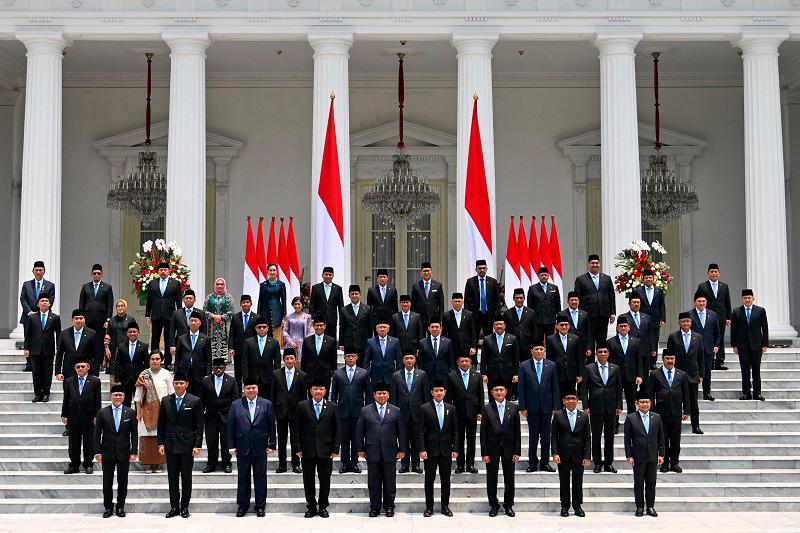Jakarta: Government with most politicians since Suharto's time
President Prabowo Subianto, a 73-year-old former general, chose 48 ministers and 58 deputies, in line with the figures who were part of the cabinet of his predecessor, Joko Widodo. In his inaugural address yesterday, he promised poverty eradication and nonalignment in foreign policy. In the coming gioani the “red-white” administration will be engaged in a three-day retreat at a military academy.
Jakarta (AsiaNews) - After being sworn in yesterday, Indonesia's new president, Prabowo Subianto, announced the formation of the new executive, consisting of 48 ministers and 58 deputies, a considerable increase from the 34 ministers and 30 deputies of his predecessor, Joko Widodo.
Several personalities, however, have been confirmed, a move that analysts say is a response to Widodo's tacit support for the nomination, and the subsequent election of his eldest son Gibran Rakabuming Raka to the post of Indonesian vice president.
“It seems that Prabowo wants to repay those who supported him politically rather than prioritize institutional reforms,” political scientist Lina Miftahul Jannahalla told the BBC. The list also includes people close to businessmen who financed his campaign, such as Minister for State-Owned Enterprises Erick Thohir.
Others say the new government will follow the course set over the past 10 years by Jokowi, who focused heavily on economic development and infrastructure construction.
The government team will still include Finance Minister Sri Mulyani, who has reformed Indonesia's tax system and will coordinate what is seen as the new president's flagship program: the distribution of free meals to the country's 20 million children.
Prabowo, 73, a retired general accused of human rights abuses, was elected in February with 58 percent of the vote after two unsuccessful attempts to seize power. During his inauguration speech yesterday, he promised to eradicate corruption and poverty and said he wants to achieve food and energy self-sufficiency before the end of his five-year term. “That is why I call on the Indonesian people to unite with the entire nation to achieve our common interests and goals,” the new president said.
Among the stated goals is an 8 percent economic growth, an unattainable goal according to an AsiaNews source, due to “the lack of capital to finance all projects.” Others have expressed concern about an executive (called “Merah-Putih,” red-and-white, the colors of the Indonesian flag) that, due to dozens of new positions, is likely to be extremely costly and inoperative.
The last time Indonesia had a cabinet of more than 40 ministers was from 1993 to 1998, during former President Suharto's last term. In May, the law that set the maximum number of ministries at 34 was abolished. The first activity the new executive will take part in will be a three-day retreat Oct. 25-27 at a military academy in central Java. Ministers and their deputies will sleep in tents and meet to better understand Prabowo's vision.
On the foreign policy front, however, he reiterated Indonesia's well-established policy of nonalignment, under which a balance between the major powers, China and the United States, is preferred.
“We will oppose all forms of colonialism and defend the interests of oppressed peoples around the world,” Prabowo said. Some 30 heads of state and government attended yesterday's swearing-in ceremony, including British Foreign Minister David Lammy, Chinese Vice President Han Zheng (with whom he had a closed-door meeting before being sworn in), Philippine President Ferdinand Marcos Jr. and Singapore Prime Minister Lawrence Wong.
Prabowo's first international engagements will be the Asia-Pacific Economic Cooperation Summit scheduled for next month, to be followed soon after by the G20 summit.
07/02/2019 17:28
11/08/2017 20:05







.png)










